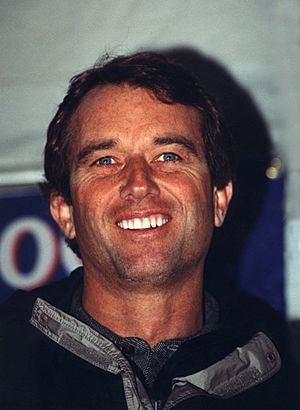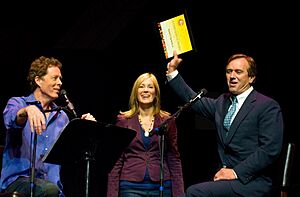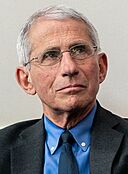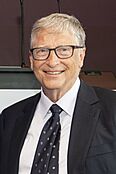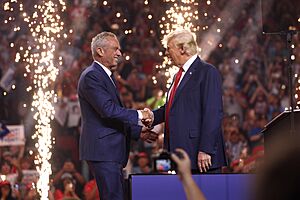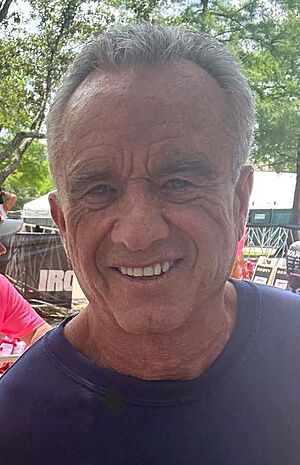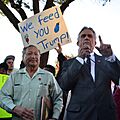Robert F. Kennedy Jr. facts for kids
Quick facts for kids
Robert F. Kennedy Jr.
|
|
|---|---|
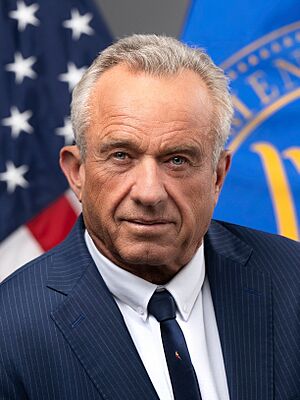
Official portrait, 2025
|
|
| 26th United States Secretary of Health and Human Services | |
| Assumed office February 13, 2025 |
|
| President | Donald Trump |
| Deputy | Jim O'Neill |
| Preceded by | Xavier Becerra |
| Personal details | |
| Born |
Robert Francis Kennedy Jr.
January 17, 1954 Washington, D.C., U.S. |
| Political party |
|
| Spouses |
|
| Children | 6 |
| Parents | |
| Relatives | Kennedy family |
| Education |
|
Robert Francis Kennedy Jr. (born January 17, 1954), also known as RFK Jr., is an American politician and environmental lawyer. He has served as the 26th United States Secretary of Health and Human Services since February 2025. He is a member of the famous Kennedy family, the son of Senator and former U.S. Attorney General Robert F. Kennedy, and a nephew of President John F. Kennedy.
Kennedy started his career as a lawyer in Manhattan. In the mid-1980s, he joined two groups focused on environmental protection: Riverkeeper and the Natural Resources Defense Council (NRDC). He also taught environmental law at Pace University School of Law and founded Pace's Environmental Litigation Clinic. In 1999, Kennedy started the Waterkeeper Alliance, an environmental group. He first ran for president as a Democrat in 2024, then as an independent candidate, before supporting Republican nominee Donald Trump.
Since 2005, Kennedy has shared views that question common scientific understanding about public health, including claims about vaccines and autism that have been disproved by science. He has faced criticism for increasing vaccine hesitancy during measles outbreaks. Kennedy is the founder and former chairman of Children's Health Defense, a group that questions vaccines. He has written several books, including The Riverkeepers (1997) and Crimes Against Nature (2004).
Contents
Early Life and Education
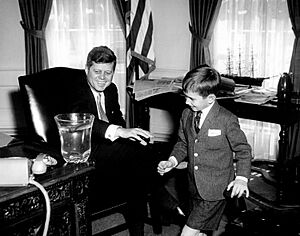
Robert Francis Kennedy Jr. was born in Washington, D.C., on January 17, 1954. He is the third of eleven children of Senator Robert F. Kennedy and Ethel Skakel. He is also the nephew of President John F. Kennedy and Senator Ted Kennedy.
Kennedy grew up at the Kennedy Compound in Hyannis Port, Massachusetts, and at Hickory Hill in McLean, Virginia. He graduated from Palfrey Street School in 1972. He then attended Harvard University, earning a Bachelor of Arts degree in American history and literature in 1976. He later earned a law degree from the University of Virginia School of Law in 1982 and a Master of Laws from Pace University in 1987.
He was nine years old when his uncle, President John F. Kennedy, was assassinated in 1963. He was 14 when his father was assassinated in 1968 while running for president. Kennedy was with his father when he passed away and was a pallbearer at his funeral.
Legal Career and Environmental Work
Manhattan District Attorney's Office
In 1982, Kennedy became an assistant district attorney for Manhattan. He resigned in July 1983 after not passing the New York bar exam. He later passed the bar exam in 1985.
Riverkeeper
In 1984, Kennedy started volunteering at the Hudson River Fisherman's Association, which became Riverkeeper in 1986. After becoming a lawyer, Riverkeeper hired him as a senior attorney. Kennedy worked on environmental lawsuits on the East Coast, including for Hudson Riverkeeper and the Long Island Soundkeeper. He sued cities and industries, like General Electric, to stop pollution and clean up contaminated areas. His work helped set important environmental legal standards.
In 1997, he co-wrote The Riverkeepers, a book about the early Riverkeeper movement. Kennedy also led a long effort to close the Indian Point nuclear power plant. He argued that renewable energy could replace the power it provided. Kennedy left Riverkeeper in 2017.
Pace Environmental Litigation Clinic
In 1987, Kennedy founded the Environmental Litigation Clinic at Pace University School of Law. For 30 years, he was a supervising attorney and co-director there. He helped his students practice law and take cases against polluters in state and federal courts. The clinic's main clients were Riverkeeper and Long Island Soundkeeper.
The clinic sued governments and companies for polluting the Long Island Sound and the Hudson River. They also worked to expand public access to the shoreline. In 2010, a lawsuit by Pace forced ExxonMobil to clean up oil spills in Newtown Creek in Brooklyn. The Pace Clinic became a model for other environmental law clinics across the country.
Waterkeeper Alliance
In June 1999, Kennedy and other Riverkeepers founded the Waterkeeper Alliance. This group now supports 344 Waterkeeper programs in 44 countries. As president, Kennedy managed its legal, membership, and fundraising efforts. The Alliance works to promote "swimmable, fishable, drinkable waterways, worldwide."
Under Kennedy's leadership, Waterkeeper launched campaigns against pollution from coal mining and burning, and from factory farms. Kennedy argued that factory farms produce less healthy food and harm independent farmers. Kennedy resigned from the Waterkeeper Alliance presidency in November 2020.
New York City Watershed Agreement
Starting in 1991, Kennedy represented environmental groups and New York City water users in lawsuits against New York City and polluters. In 1996, he helped create the $1.2 billion New York City Watershed Agreement. This agreement is seen as an international example for sustainable development and cooperation.
Kennedy & Madonna LLP
In 2000, Kennedy co-founded the environmental law firm Kennedy & Madonna, LLP. The firm represents individuals and groups against polluters. In 2004, the firm helped secure a $70 million settlement for property owners in Pensacola, Florida, whose land was contaminated by chemicals.
The firm was featured in the 2010 HBO documentary Mann v. Ford, which showed their work helping the Ramapough Mountain Indians against the Ford Motor Company for dumping toxic waste. Kennedy was also recognized for his role in a $396 million jury verdict against DuPont for contamination from a zinc plant. In 2017, the firm helped secure a $670 million settlement for residents whose drinking water was contaminated by a chemical released by DuPont.
Morgan & Morgan
In 2016, Kennedy became a lawyer for the Morgan & Morgan law firm. In 2017, Kennedy and his team sued Monsanto on behalf of people who claimed their non-Hodgkin's lymphoma was caused by exposure to Monsanto's glyphosate-based herbicide, Roundup. They also filed a class action lawsuit against Monsanto for not warning consumers about alleged dangers of Roundup.
In September 2018, Kennedy and his partners filed a lawsuit against Columbia Gas of Massachusetts after gas explosions in three towns.
Other Ventures
In 1999, Kennedy co-founded Keeper Springs, a bottled water company that donated all its profits to Waterkeeper Alliance. He has also been involved with cleantech companies and energy storage projects. Kennedy was a co-owner of Utility Integration Solutions (UISol), a smart-grid company, and is currently a co-owner of GridBright. In 2011, he co-founded EcoWatch, an environmental news site, and resigned from its board in 2018.
Helping Communities and Indigenous Rights
Kennedy has worked to protect the environment in minority and poor communities. In 1987, he successfully sued Westchester County to reopen Croton Point Park, which was used by poor and minority communities. He also helped reopen Pelham Bay Park.
Starting in 1985, Kennedy helped develop international programs for environmental and human rights for the Natural Resources Defense Council (NRDC). He traveled to Canada and Latin America to help indigenous tribes protect their lands from large energy projects. He assisted the Pehuenche people in Chile and the Cree Indians in Quebec in their efforts against dam construction.
Kennedy also worked with Vancouver Island First Nations to stop industrial logging. He helped Mexican fishermen stop Mitsubishi from building a salt facility in an area where gray whales breed.
Kennedy was an early editor of Indian Country Today, a Native American newspaper. He helped lead efforts against damming the Futaleufú River in Chile.
Military and Vieques
Kennedy has criticized environmental damage caused by the U.S. military. In 2001, he sued the U.S. Navy on behalf of people in Vieques, Puerto Rico, to stop weapons testing. He argued that these activities harmed endangered species, polluted waters, and affected residents' health. He was arrested for protesting at the Navy training facility and served 30 days in prison. These efforts eventually led to the end of naval bombing in Vieques.
In 2003, Kennedy wrote that the U.S. federal government is "America's biggest polluter" and the U.S. Department of Defense is the worst offender.
Political Aspirations
Kennedy considered running for political office in 2000 and for New York attorney general in 2006. In 2008, he decided not to seek the U.S. Senate seat that Hillary Clinton vacated.
In the 2000s, Kennedy was often considered for top environmental jobs in Democratic administrations, including for the White House Council on Environmental Quality and EPA administrator.
2024 Presidential Campaign
Kennedy announced he was considering running for president in 2024 on March 3, 2023. He officially filed for the Democratic presidential nomination on April 5, 2023, and formally declared his candidacy on April 19. On October 9, he became an independent candidate. He is the fifth member of his family to seek the presidency.
Kennedy's campaign received support from some Republican donors. On August 23, 2024, Kennedy withdrew from the presidential race and endorsed Donald Trump. He stated that he and Trump were "aligned on many key issues."
Secretary of Health and Human Services (2025–present)
Nomination and Confirmation
Days before the 2024 United States presidential election, Donald Trump said Kennedy would have "a big role in health care." On November 14, 2024, after winning the election, Trump announced his plan to nominate Kennedy for Secretary of Health and Human Services (HHS).
Criticism
In December 2024, more than 75 Nobel Laureates urged the U.S. Senate to oppose Kennedy's nomination, stating it would "put the public's health in jeopardy." Over 17,000 doctors also signed an open letter opposing his nomination, arguing he had undermined public confidence in vaccines and spread false claims. Gregg Gonsalves, an epidemiologist at the Yale School of Public Health, compared it to "putting a flat earther in charge of NASA."
Senate Nomination Hearings
In January 2025, the Senate Committee on Finance and the Senate Health, Education, Labor, and Pensions Committee (HELP) held hearings for Kennedy's nomination.
Conflicts of Interest Disclosure Statement
Kennedy disclosed an arrangement with a law firm where he earns a percentage of fees from cases he refers. He stated that if confirmed, he would only keep this arrangement for cases not directly involving the federal government. He also said he would assign his son his interests in litigation against the maker of Gardasil, a vaccine for cervical cancer.
Committee Votes
On February 4, 2025, the Senate Committee on Finance voted 14–13 to send Kennedy's nomination to a full Senate vote.
Confirmation Vote
On February 13, 2025, the Senate confirmed Kennedy as Secretary of Health and Human Services by a vote of 52 to 48. Former Senate Republican Conference leader Mitch McConnell was the only Republican to vote against him, citing concerns about efforts to question the polio vaccine.
Tenure
On February 13, 2025, Kennedy was sworn in as the 26th Secretary of Health and Human Services. He is the first independent or third-party presidential candidate to become a cabinet member after running for president.
"Make America Healthy Again" Executive Order
Soon after Kennedy was sworn in, Trump signed Executive Order 14211, creating a "Make America Healthy Again" (MAHA) Commission, chaired by Kennedy. Its goals include investigating childhood diseases and assessing the use of certain medications.
Staff Changes
On February 14, 2025, agencies like the Centers for Disease Control and Prevention (CDC) and the National Institutes of Health (NIH) were informed that about 5,200 newly hired federal health workers would be let go. In April 2025, Kennedy also made significant staff changes at the National Institute for Occupational Safety and Health. In June 2025, Kennedy announced he was replacing all 17 members of the ACIP.
Stopping Flu Vaccine Ads
On February 20, 2025, during a severe flu season, HHS instructed the CDC to stop its ad campaign promoting flu vaccination.
2025 Southwest United States Measles Outbreak
Kennedy's time in office began during a measles outbreak in the southwestern U.S., which included the first measles death in a decade. The Texas Department of State Health Services reported many cases and hospitalizations. Kennedy stated that measles outbreaks happen every year and that hospitalizations were "mainly for quarantine," a claim health professionals disagreed with. Senator Ron Wyden criticized Kennedy, saying, "Nothing about kids dying from measles is normal."
Days later, Kennedy called the outbreak a "top priority." He suggested treatments like cod liver oil and vitamin A, which are not standard for measles. While recommending vaccination, he also suggested that getting the disease might be better for immunity, which is contrary to CDC guidance that the MMR vaccine is "much safer than getting measles."
On February 28, HHS spokesperson Thomas Corry resigned, reportedly due to disagreements with Kennedy's handling of the outbreak. On March 2, Kennedy wrote an article calling vaccines a "personal choice" and recommending vitamins and good nutrition for measles. He also wrote that "Vaccines not only protect individual children from measles, but also contribute to community immunity."
After Kennedy's comments about vitamin A, doctors in Texas saw children with measles also showing signs of vitamin A toxicity. On March 28, Kennedy told Peter Marks, head of FDA's vaccine program, to resign. Marks's resignation letter stated that Kennedy "wishes subservient confirmation of his misinformation and lies."
MAHA Report
On May 22, 2025, the MAHA Commission released a report on childhood chronic disease. It suggested factors like diet, vaccinations, and pesticides as "potential drivers." It was later reported that some studies cited in the report did not exist, and others were misrepresented. The report was updated multiple times to correct errors.
Views on Public Health
Kennedy is a notable figure in the movement that questions vaccines. Michael Osterholm, an infectious disease specialist, has said that Kennedy's "disinformation" is effective because it appears scientific. Kennedy states he is not against vaccines but wants them to be more thoroughly tested. However, in July 2023, he said, "There's no vaccine that is safe and effective."
In January 2024, Kennedy suggested that Lyme disease might have been a "military weapon," a claim experts have called "absurd."
Vaccines and Autism Claims
From 2015 to 2023, Kennedy chaired Children's Health Defense, a group that questions vaccines. The group claims that exposure to certain chemicals and radiation has caused conditions like autism and food allergies in children. Children's Health Defense has campaigned against vaccines and other substances. Members of Kennedy's family have criticized him for spreading "dangerous misinformation."
Kennedy and Children's Health Defense have falsely claimed that vaccines cause autism. They focused on vaccines that contained thimerosal, a mercury-based preservative. However, thimerosal has never been used in MMR or chickenpox vaccines, and it was removed from most childhood vaccines by 2001. The CDC states there is "no convincing evidence of harm caused by the low doses of thimerosal in vaccines."
In April 2015, Kennedy promoted a film that linked autism to mercury in vaccines. He has been criticized for comparing the increase in autism diagnoses to a "holocaust." In February 2021, Kennedy's Instagram account was removed for "repeatedly sharing debunked claims" about COVID-19 vaccines.
Writings and Speeches
In June 2005, Kennedy wrote an article, "Deadly Immunity", which claimed a government conspiracy to hide a link between thimerosal and childhood disorders. The article contained errors, and Salon.com later retracted it. Kennedy claimed Salon was pressured by the government and pharmaceutical industry, but Salon stated it was due to "incontrovertible truth."
In 2014, Kennedy's book Thimerosal: Let the Science Speak was published. The book's preface was written by Mark Hyman, a supporter of functional medicine.
Meeting with Donald Trump
On January 10, 2017, Kennedy met with then-President-elect Donald Trump to discuss a position in the Trump administration. Kennedy stated he accepted an offer to chair a Vaccine Safety Task Force, but Trump's team said no final decision had been made.
Controversy with Robert De Niro
On February 15, 2017, Kennedy and actor Robert De Niro held a press conference, claiming the press was biased towards the vaccination industry. They offered a $100,000 reward for proof that injecting mercury into babies and pregnant women at current flu vaccine levels is safe. This challenge was criticized as "not science."
Samoa Measles Outbreak
In June 2019, during a visit to Samoa, Kennedy appeared with an anti-vaccine activist. Kennedy's charity and the activist had spread claims that the MMR vaccine caused deaths of two Samoan infants, despite later findings that the infants received a muscle relaxant by mistake. Kennedy has been criticized for increasing vaccine hesitancy during the 2019 Samoa measles outbreak, which killed over 70 people.
COVID-19
During the COVID-19 pandemic, Kennedy promoted various views related to COVID, including claims that Anthony Fauci and the Bill & Melinda Gates Foundation sought to profit from vaccines. In August 2020, Kennedy appeared in an interview with Alec Baldwin and shared incorrect claims about vaccines.
In May 2021, Kennedy asked the FDA to remove authorization for all COVID vaccines. These vaccines had saved many lives in the United States. Kennedy's Instagram account was blocked in February 2021 for "repeatedly sharing debunked claims." He has also expressed skepticism about the pandemic's impact, suggesting it benefited billionaires.
In November 2021, Kennedy's book The Real Anthony Fauci was published. In it, Kennedy claims that Fauci and Bill Gates conspired to prolong the pandemic and promote expensive vaccinations. The book repeats discredited ideas about COVID-19. Fauci has called Kennedy "a very disturbed individual."
In January 2022, during a speech, Kennedy made a comparison that was widely condemned as insensitive. He later apologized for his comment. In July 2023, Kennedy was recorded saying that COVID-19 might be "ethnically targeted," a claim that was criticized by Jewish organizations and experts as feeding into conspiracy theories.
Pushback from the Kennedy Family
Several members of Kennedy's family have spoken out against his views on public health. On May 8, 2019, his niece Maeve Kennedy McKean and older siblings Kathleen and Joseph wrote an open letter stating that he "has helped to spread dangerous misinformation." On December 30, 2020, another niece, Kerry Kennedy Meltzer, a doctor, wrote a similar letter.
On January 28, 2025, Caroline Kennedy publicly criticized Kennedy in a letter to U.S. senators and in a video, stating he was unqualified for the Secretary of HHS role.
Political Views
Kennedy's political discussions often include ideas that question common explanations.
Economic Inequality
Kennedy has argued that poor communities are unfairly affected by environmental pollution. He has stated that the "systematic" decline of the middle class is happening, and that the financial industry and military–industrial complex are funded at the expense of the American middle class. He believes the U.S. government is influenced by corporate power. Kennedy supports the idea that wealthy people and corporations should pay more taxes.
Foreign Affairs and Military Intervention
Kennedy is critical of U.S. alliances with some governments, like Saudi Arabia. He has criticized the Saudi-led intervention in the Yemeni civil war. Kennedy supports Israel.
He opposes the military industry and foreign interventions. Kennedy criticized the Iraq War and U.S. support for Ukraine against Russia's invasion. He called for a peace agreement in Ukraine. Kennedy believes Ukraine should not join NATO and has suggested admitting Russia to NATO to reduce tensions. He has also called for reducing U.S. military presence in other nations.
Kennedy has criticized the operations of former CIA director Allen Dulles, condemning U.S.-backed actions like the 1953 Iranian coup d'état. He believes the CIA needs to be restructured.
Environmental Policy
In 2023, Kennedy described himself as a leading environmentalist. He supports environmental policies that are critical of large corporations, claiming that some groups have taken over the climate crisis discussion. He believes environmentalists should focus on the "carbon industry." Kennedy has stated that the current economy relies too much on "coal and oil."
Kennedy supports a global shift from fossil fuels to renewable energy, but he has opposed hydropower from dams. He argues that solar and wind energy can reduce costs and improve air quality. Kennedy helped create a ban on fracking in New York State in 2013. He has also participated in protests against the Keystone XL Pipeline and the Dakota Access pipeline.
Kennedy believes the oil industry remains competitive only because of large subsidies. He supported Alexandria Ocasio-Cortez's Green New Deal resolution. He has spoken against geoengineering, seeing it as a way for big businesses to profit from climate change.
Kennedy supports regenerative farming. He has opposed conventional nuclear power, arguing it is unsafe and not economically competitive. He has criticized the environmental policies of past U.S. presidents, including George W. Bush and Donald Trump.
Questioning Election Validity
Kennedy has questioned the fairness of the voting process. In 2006, he wrote an article claiming that the 2004 presidential election was stolen, a claim that was widely seen as a conspiracy theory. He has also written about the risks of election hacking.
Political Endorsements
Kennedy worked on his uncle Sargent Shriver's 1976 presidential campaign and his uncle Ted Kennedy's 1980 campaign. He supported Al Gore in 2000 and John Kerry in 2004. After Kerry lost, Kennedy wrote an article falsely claiming the election results were fraudulent.
In 2007, Kennedy endorsed Hillary Clinton in the 2008 Democratic primaries. After the Democratic Convention, he campaigned for Obama. In 2024, Kennedy endorsed Donald Trump for president.
Other Views
Food Allergies
Kennedy was a founding board member of the Food Allergy Initiative. His son has anaphylactic peanut allergies. Kennedy wrote the foreword to The Peanut Allergy Epidemic, which links increasing food allergies in children to certain vaccines, a claim that is not supported by scientific evidence.
Murder of Martha Moxley
In 2003, Kennedy published an article about the 1975 murder of Martha Moxley, arguing that his cousin Michael Skakel was wrongly convicted. Kennedy suggests that another person, Kenneth Littleton, was the killer. In 2016, Kennedy released the book Framed: Why Michael Skakel Spent over a Decade in Prison for a Murder He Didn't Commit. Skakel's conviction was later vacated.
Assassinations of John F. Kennedy and Robert F. Kennedy
Kennedy believes that Lee Harvey Oswald did not act alone in the assassination of his uncle, President John F. Kennedy. He has stated that the evidence of CIA involvement is "beyond any reasonable doubt."
Kennedy also does not believe that Sirhan Sirhan fired the shot that killed his father, Robert F. Kennedy. Based on eyewitness accounts and the autopsy, he believes there was a second gunman. In 2017, he met Sirhan and expressed support for a reinvestigation of the assassination.
Gender Dysphoria
In a June 2023 interview, Kennedy suggested that some issues in children, including gender dysphoria, might be linked to atrazine contamination in water. He cited a study on frogs. Experts have stated that this hypothesis lacks evidence.
Raw Milk
Kennedy states that he drinks only raw milk and believes it has health benefits. He has criticized the FDA's stance on raw milk. Experts and the FDA say raw milk is not more nutritious than pasteurized milk and carries disease risks.
Personal Life
General Interests
Kennedy is a licensed master falconer and has trained hawks since he was 11. He also breeds hawks and falcons. He was president of the New York State Falconry Association from 1988 to 1991.
Kennedy is also a whitewater kayaker. His father introduced him to whitewater kayaking. Between 1976 and 1981, Kennedy was a partner and guide at a whitewater company. He led several "first-descent" whitewater expeditions to Latin America. In 2015, he took two of his sons to the Yukon to visit Mount Kennedy, which his father was the first to climb.
Marriages and Children
On April 3, 1982, Kennedy married Emily Ruth Black. They divorced in 1994. On April 15, 1994, Kennedy married architect and designer Mary Kathleen Richardson. Kennedy has six children, two with Black and four with Richardson. Mary Richardson Kennedy passed away in 2012.
In 2012, Kennedy began dating actress Cheryl Hines. They married on August 2, 2014, at the Kennedy Compound. They live in Los Angeles and Cape Cod, Massachusetts.
Health
In his 40s, Kennedy developed adductor spasmodic dysphonia, a voice disorder that makes speech difficult. He has also spoken about experiencing memory loss and mental fog, which he attributed to a past infection and mercury poisoning from eating large amounts of tuna.
Religion
Kennedy is a Roman Catholic. He considers Francis of Assisi his patron saint and a role model, admiring Francis's dedication to social justice, helping the poor, and environmentalism. Kennedy believes that "environmental work is spiritual work." He published a biography, Saint Francis of Assisi: A Life of Joy, in 2004.
Selected Works
Kennedy has written books on subjects such as the environment, public health, and biographies. Two of his books, The Real Anthony Fauci and Vax-Unvax: Let the Science Speak are New York Times Bestsellers.
- Kennedy, Robert F. Jr., ed. (2014). Thimerosal: Let the Science Speak: The Evidence Supporting the Immediate Removal of Mercury – a Known Neurotoxin – from Vaccines. New York: Skyhorse Publishing. ISBN 978-1-63220-601-5.
Children's Books
- Robert F. Kennedy Jr.'s ...: The Story of the Hudson River (2005)
Images for kids
-
Kennedy at a UFC fight in November 2024, with Elon Musk, Tulsi Gabbard, Donald Trump, Mike Johnson, Vivek Ramaswamy, Donald Trump Jr, Dana White, and Kid Rock
See also
 In Spanish: Robert F. Kennedy Jr. para niños
In Spanish: Robert F. Kennedy Jr. para niños


